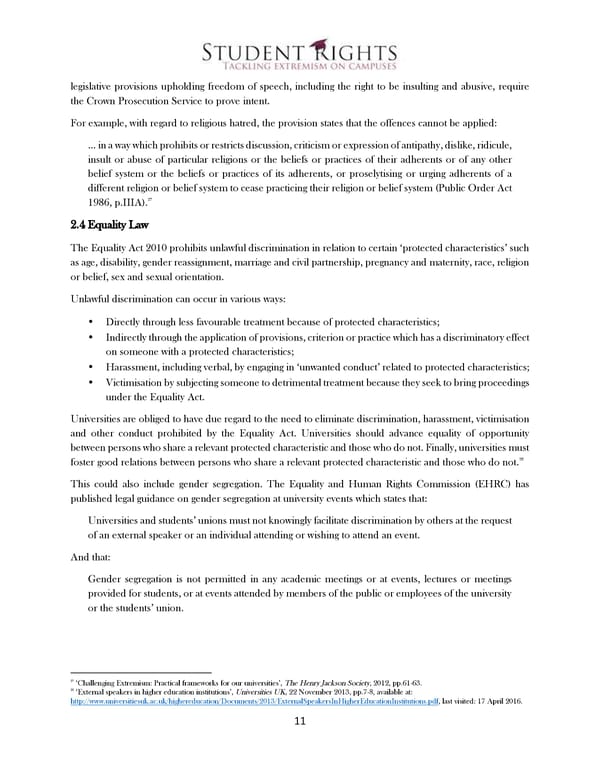! legislative provisions upholding freedom of speech, including the right to be insulting and abusive, require the Crown Prosecution Service to prove intent. For example, with regard to religious hatred, the provision states that the offences cannot be applied: … in a way which prohibits or restricts discussion, criticism or expression of antipathy, dislike, ridicule, insult or abuse of particular religions or the beliefs or practices of their adherents or of any other belief system or the beliefs or practices of its adherents, or proselytising or urging adherents of a different religion or belief system to cease practicing their religion or belief system (Public Order Act 27 1986, p.IIIA). 2.4 Equality Law The Equality Act 2010 prohibits unlawful discrimination in relation to certain ‘protected characteristics’ such as age, disability, gender reassignment, marriage and civil partnership, pregnancy and maternity, race, religion or belief, sex and sexual orientation. Unlawful discrimination can occur in various ways: •! Directly through less favourable treatment because of protected characteristics; •! Indirectly through the application of provisions, criterion or practice which has a discriminatory effect on someone with a protected characteristics; •! Harassment, including verbal, by engaging in ‘unwanted conduct’ related to protected characteristics; •! Victimisation by subjecting someone to detrimental treatment because they seek to bring proceedings under the Equality Act. Universities are obliged to have due regard to the need to eliminate discrimination, harassment, victimisation and other conduct prohibited by the Equality Act. Universities should advance equality of opportunity between persons who share a relevant protected characteristic and those who do not. Finally, universities must 28 foster good relations between persons who share a relevant protected characteristic and those who do not. This could also include gender segregation. The Equality and Human Rights Commission (EHRC) has published legal guidance on gender segregation at university events which states that: Universities and students’ unions must not knowingly facilitate discrimination by others at the request of an external speaker or an individual attending or wishing to attend an event. And that: Gender segregation is not permitted in any academic meetings or at events, lectures or meetings provided for students, or at events attended by members of the public or employees of the university or the students’ union. !!!!!!!!!!!!!!!!!!!!!!!!!!!!!!!!!!!!!!!!!!!!!!!!!!!!!!!!!!!!! 27 ‘Challenging Extremism: Practical frameworks for our universities’, The Henry Jackson Society, 2012, pp.61-63. 28 ‘External speakers in higher education institutions’, Universities UK, 22 November 2013, pp.7-8, available at: http://www.universitiesuk.ac.uk/highereducation/Documents/2013/ExternalSpeakersInHigherEducationInstitutions.pdf, last visited: 17 April 2016. 11! !
 A Model External Speaker Policy Page 12 Page 14
A Model External Speaker Policy Page 12 Page 14